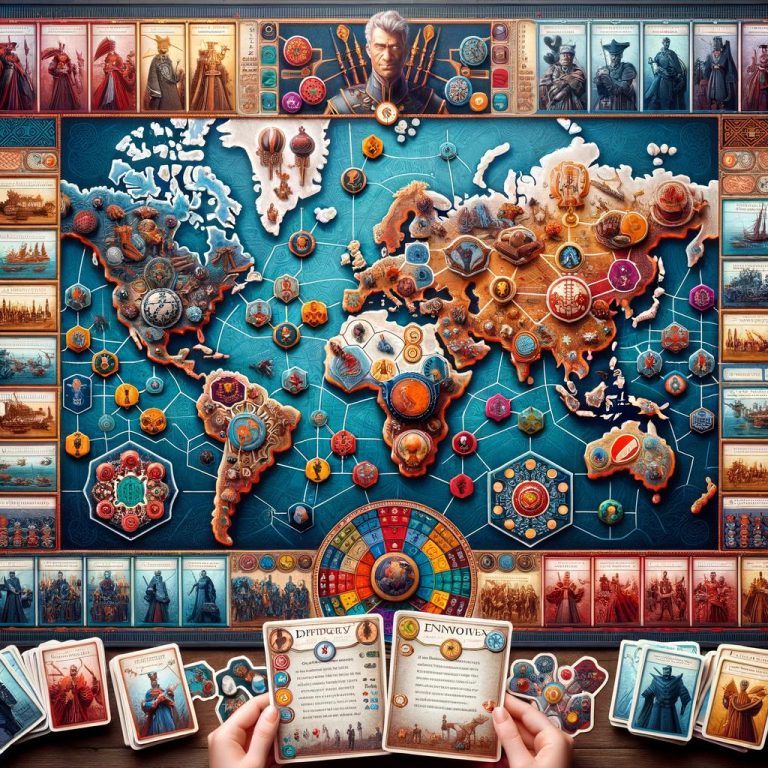Board game diplomacy strategy is a crucial element in the world of tabletop gaming, where players engage in strategic interactions to outmaneuver their opponents. This article delves into the intricacies of diplomatic strategy and its significance in games like Risk, Diplomacy, and Settlers of Catan. Understanding how to effectively negotiate, form alliances, and influence other players can often determine the outcome of a game.
The history of board game diplomacy strategy can be traced back to ancient civilizations where negotiations and treaties were crucial elements in conflict resolution. Over time, this concept has evolved into a complex system of alliances and betrayals that adds depth and intrigue to modern tabletop gaming experiences. Players must carefully strategize their diplomatic approach to gain advantages while avoiding common pitfalls.
In exploring different types of diplomatic strategies in board games, players have a range of options at their disposal. From forming temporary alliances for mutual benefit to using deception and manipulation to achieve their goals, mastering the art of diplomacy can give players a competitive edge. By analyzing successful diplomatic strategies in popular games, individuals can adapt proven tactics to enhance their gameplay and emerge victorious.
History of Board Game Diplomacy Strategy
Board games have long been a popular form of entertainment and strategic challenge for players of all ages. The concept of diplomatic strategy in board games dates back to some of the earliest known board games, where players had to forge alliances, negotiate deals, and betray opponents to secure victory. One of the most iconic examples of early diplomatic strategy in board games is the game Diplomacy, which was first released in the 1950s and remains a classic among enthusiasts.
Evolution of Diplomatic Strategy
Over the years, the strategic depth and complexity of diplomatic tactics in board games have continued to evolve. As game designers experiment with new mechanics and player interactions, diplomatic strategy has become more nuanced and integral to gameplay. From negotiation-heavy games like Settlers of Catan to war simulations like Risk, players are constantly challenged to navigate the delicate balance between cooperation and competition.
Influence From Real-World Politics
Many board game diplomacy strategies draw inspiration from real-world politics and historical events. Players can learn valuable lessons about negotiation, compromise, and power dynamics by immersing themselves in these virtual worlds. By studying how diplomatic maneuvers play out on the game board, players can gain insights into human nature and social interactions that can be applied beyond the confines of game night.
Types of Diplomatic Strategies in Board Games
Diplomatic strategy in board games is a key component that often separates the winners from the losers. Players need to navigate alliances, negotiations, and betrayals to come out on top. There are various approaches that players can take to leverage diplomacy to their advantage and ultimately increase their chances of victory. Here are some different types of diplomatic strategies that players can employ:
- Aggressive Diplomacy: This strategy involves using strong-arm tactics, threats, and intimidation to manipulate other players into making decisions that benefit you. It may involve forming alliances with weaker players for protection while secretly plotting their downfall.
- Subtle Manipulation: In contrast to aggressive diplomacy, this strategy focuses on subtle manipulation and persuasion. Players employing this tactic may use charm, deception, or subtle hints to influence others without necessarily resorting to overt threats or direct confrontation.
- Negotiation and Compromise: A more cooperative approach, this strategy emphasizes open communication, negotiation, and compromise with other players. By building trust and establishing mutually beneficial agreements, players can create stable alliances and secure their position on the board.
Each type of diplomatic strategy has its own advantages and disadvantages depending on the game being played and the personalities of the players involved. It is essential for players to adapt their approach based on the dynamics of the game and the behaviors of their opponents. Mastering these various diplomatic strategies can make a significant difference in one’s success in board games revolving around diplomacy like Risk, Diplomacy, or Settlers of Catan.
Players must remember that flexibility is key when it comes to implementing diplomatic strategies in board games. Being too rigid or stubborn in your approach can backfire as situations evolve rapidly during gameplay. By understanding the different types of diplomatic strategies available and knowing when to switch between them strategically, players can increase their chances of coming out victorious in challenging board game scenarios where diplomacy plays a crucial role in determining the outcome.
Case Studies
When it comes to board game diplomacy strategy, some games stand out for the depth of diplomatic interactions they require. Risk, for example, is known for the complex alliances and betrayals that can shape the outcome of the game.
Successful players in Risk often employ a mix of patience, negotiation skills, and strategic thinking to form alliances with other players while keeping their own goals in mind. By understanding their opponents’ motivations and leveraging the power dynamics at play, players can navigate through uncertain territory with careful diplomacy.
In contrast, Diplomacy is a game solely focused on negotiation and deal-making among players. The absence of randomness in Diplomacy means that success heavily relies on a player’s ability to forge strong alliances and betray them at the right moment. Crafting deceitful strategies while maintaining trust with key allies is crucial in this high-stakes game of international relations. Players who excel in Diplomacy understand the importance of timing, communication, and calculated risks to achieve their diplomatic objectives.
Settlers of Catan introduces a different dimension to board game diplomacy strategy with its resource management mechanics. The ability to trade resources with other players opens up opportunities for cooperation or competition depending on the strategic goals of each participant. Successful Settlers of Catan players excel at reading their opponents’ intentions and adapting their diplomatic approach accordingly. By balancing short-term gains with long-term alliances, players can secure valuable resources while positioning themselves strategically on the board.
| Game | Key Strategy |
|---|---|
| Risk | Patience, negotiation skills, strategic thinking |
| Diplomacy | Deal-making, betrayal at the right moment |
| Settlers of Catan | Resource management, reading opponents’ intentions |
Common Mistakes to Avoid in Board Game Diplomacy Strategy
When engaging in board game diplomacy strategy, it is important to be mindful of common mistakes that can hinder your success. Understanding these pitfalls and knowing how to avoid them can greatly enhance your diplomatic gameplay and increase your chances of emerging victorious. Here are some key mistakes to watch out for:
- Overpromising: One of the most common mistakes players make in board game diplomacy is overcommitting or making promises they cannot keep. This can lead to mistrust among other players and ultimately backfire on you. It is crucial to only make promises that you can realistically fulfill.
- Being Too Aggressive: While assertiveness is important in diplomacy, being overly aggressive can alienate other players and make it difficult to form alliances or negotiate deals. Finding a balance between assertiveness and cooperation is essential for successful diplomatic strategy.
- Ignoring Communication: Effective communication is a fundamental aspect of diplomacy in board games. Failing to communicate with other players, listen to their proposals, or take their perspectives into account can isolate you from potential allies and limit your strategic options.
Avoiding these common mistakes can improve your overall diplomatic strategy and increase your chances of achieving victory in board games that involve negotiation and alliance-building dynamics. By being aware of these pitfalls and actively working to steer clear of them, you can elevate your gameplay and outmaneuver opponents who may fall into these traps.
Remember, mastering board game diplomacy strategy requires a keen awareness of the dynamics at play, the ability to adapt to different situations, and the skill to navigate complex social interactions with fellow players. By learning from past mistakes and continually honing your diplomatic skills, you can enhance your strategic prowess and become a formidable force in any competitive gaming environment where negotiation and alliances are key components.
Tips and Tricks for Mastering Diplomacy in Board Games
Reading the Room
One essential tip for mastering diplomacy in board games is to carefully observe and analyze the dynamics between players. Reading the room and understanding the relationships, alliances, and motivations of your opponents can give you a strategic edge. Pay attention to body language, tone of voice, and verbal cues during negotiations to gauge where other players stand. This insight can help you tailor your approach and responses to different players, increasing your chances of securing favorable deals or alliances.
Timing Is Key
Another crucial aspect of diplomatic strategy in board games is timing. Knowing when to make a move, propose an alliance, or break off a deal can significantly impact your success in the game. Being patient and strategic in your decisions can lead to more advantageous outcomes.
Additionally, timing your negotiations or proposals at critical moments can catch opponents off guard or capitalize on their vulnerability. Mastering the art of timing in diplomacy requires foresight, adaptability, and a keen awareness of the game’s progression.
Flexibility and Adaptability
Flexibility is key when it comes to mastering diplomacy in board games. While having a long-term strategy is important, being able to adapt quickly to changing circumstances or unexpected developments is equally crucial. Remain open-minded during negotiations and be willing to consider alternative options or approaches if necessary.
Being too rigid in your diplomatic style can limit your ability to form alliances, make deals, or navigate complex interactions with other players. By staying flexible and adaptable, you can better respond to challenges and opportunities that arise during gameplay.
Implementing Diplomacy in Multiplayer Games
When it comes to multiplayer board games, the strategy of diplomacy plays a crucial role in determining the outcome of the game. Forming alliances, negotiating deals, and maintaining relationships with multiple players can significantly impact your success on the board. One key aspect of implementing diplomacy in multiplayer games is building trust among your peers. By being honest and reliable in your dealings with other players, you can establish a sense of credibility that may lead to long-lasting alliances.
Negotiating deals is another essential component of diplomatic strategy in multiplayer board games. Understanding what each player wants or needs can help you tailor your offers to better suit their interests while furthering your own goals. Offering incentives or making concessions can sometimes be the difference between a successful negotiation and a failed attempt at diplomacy. It’s important to strike a balance between being assertive in pursuing your objectives and flexible enough to adapt to changing circumstances during negotiations.
Maintaining relationships with multiple players throughout the course of a board game can be challenging but rewarding. Keeping lines of communication open, staying informed about each player’s intentions, and remaining adaptable in your approach are all critical aspects of effective diplomacy.
Building solid connections with others can help you navigate complex game scenarios, anticipate potential challenges, and capitalize on opportunities as they arise. By investing time and effort into managing relationships with multiple players, you can enhance your overall gameplay experience and increase your chances of achieving victory on the board.
| Aspect | Importance |
|---|---|
| Building Trust | Establishes credibility and leads to alliances |
| Negotiating Deals | Helps achieve goals while considering others’ interests |
| Maintaining Relationships | Key for navigating complex scenarios and seizing opportunities |
The Psychology of Diplomatic Strategy
Board games have always been a fascinating platform for players to explore various strategies, including the intricate art of diplomacy. Understanding the psychology behind diplomatic strategy can give you a significant edge in games like Risk, Diplomacy, and Settlers of Catan. By delving into the psychological aspects of negotiation, communication, and trust-building within board games, players can leverage these insights to their advantage and emerge victorious.
One key element to consider when diving into the realm of board game diplomacy strategy is the concept of trust. Building trust with other players through consistent and honest communication can lead to alliances that are strong and reliable. However, this trust must be carefully managed, as betrayals and broken promises can quickly erode any goodwill established. By understanding the psychology of trust-building and maintaining relationships in games, players can navigate the delicate balance of cooperation and competition effectively.
Furthermore, another crucial psychological aspect to consider in diplomatic strategy is perception. How others perceive your actions, words, and overall gameplay can significantly impact your success in board games. By being mindful of how your decisions are viewed by others at the gaming table, you can strategically shape perceptions to your advantage.
This includes projecting confidence without arrogance, engaging in active listening during negotiations, and strategically revealing information to manipulate perceptions in your favor. Ultimately, mastering the psychological aspects of diplomatic strategy in board games requires a keen awareness of both your own behaviors and those of your opponents to outmaneuver them effectively.
Frequently Asked Questions
What Are the Best Tactics for Diplomacy?
The best tactics for diplomacy involve effective communication, building alliances, understanding your opponents’ motivations, and maintaining flexibility in negotiations. It is crucial to be patient, observant, and strategic in your interactions to achieve favorable outcomes.
Is Diplomacy a Strategic Board Game?
Diplomacy is not a typical strategic board game in the traditional sense. While it does involve elements of strategy like negotiating alliances, making deals, and managing resources, it primarily focuses on communication and relationship-building rather than complex gameplay mechanics commonly found in strategic board games.
How Do You Win the Diplomacy Game?
Winning the Diplomacy game requires a combination of tactical maneuvering, alliance-building, negotiation skills, and adaptability. Success hinges on forming strong alliances with other players while simultaneously anticipating their moves and potential betrayals. It’s essential to strike a balance between cooperation and competition to secure victory in this challenging game of diplomacy.

I love playing all kinds of games – from classics like Monopoly to modern favourites like Ticket to Ride.
I created this blog as a way to share my love of board games with others, and provide information on the latest releases and news in the industry.





